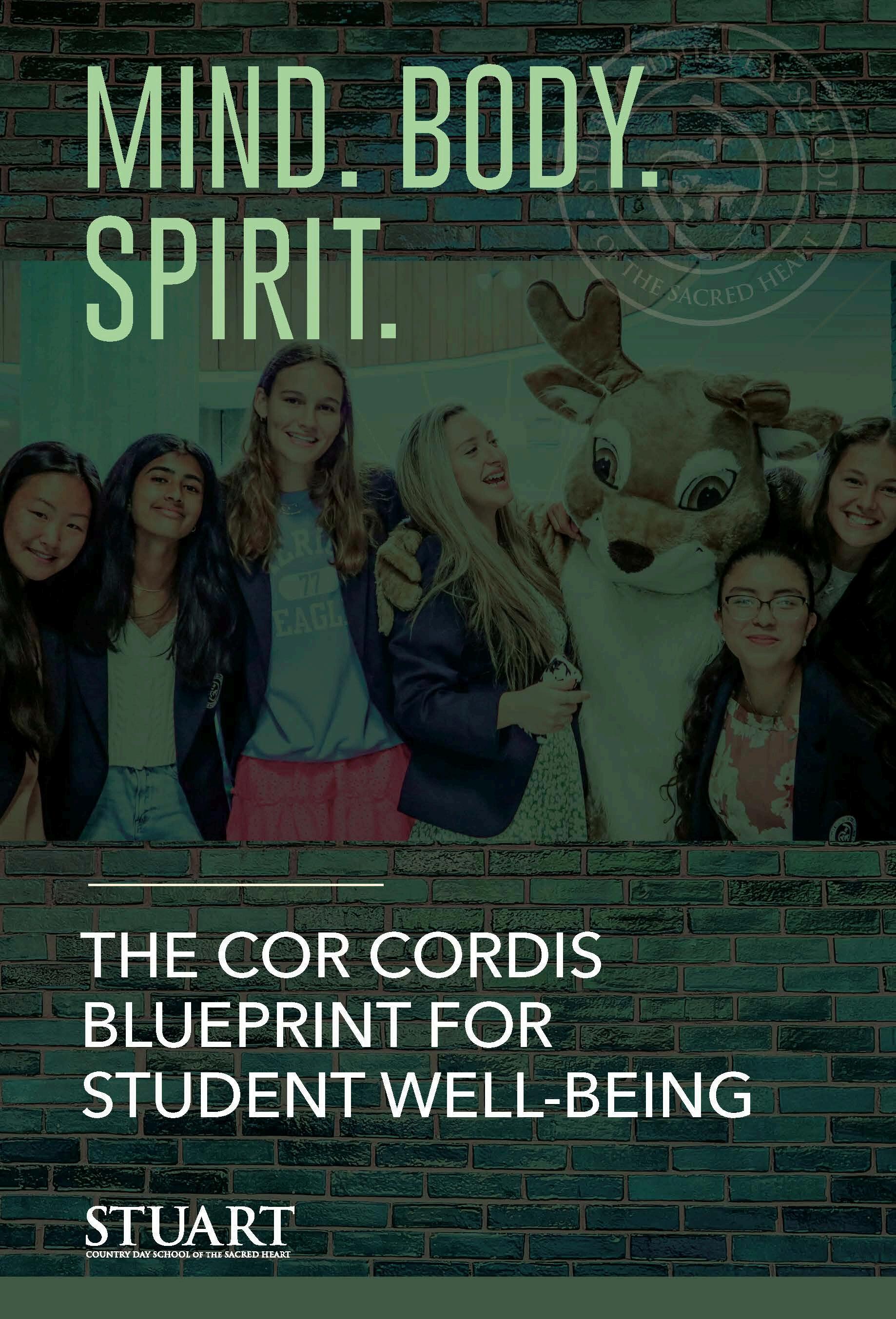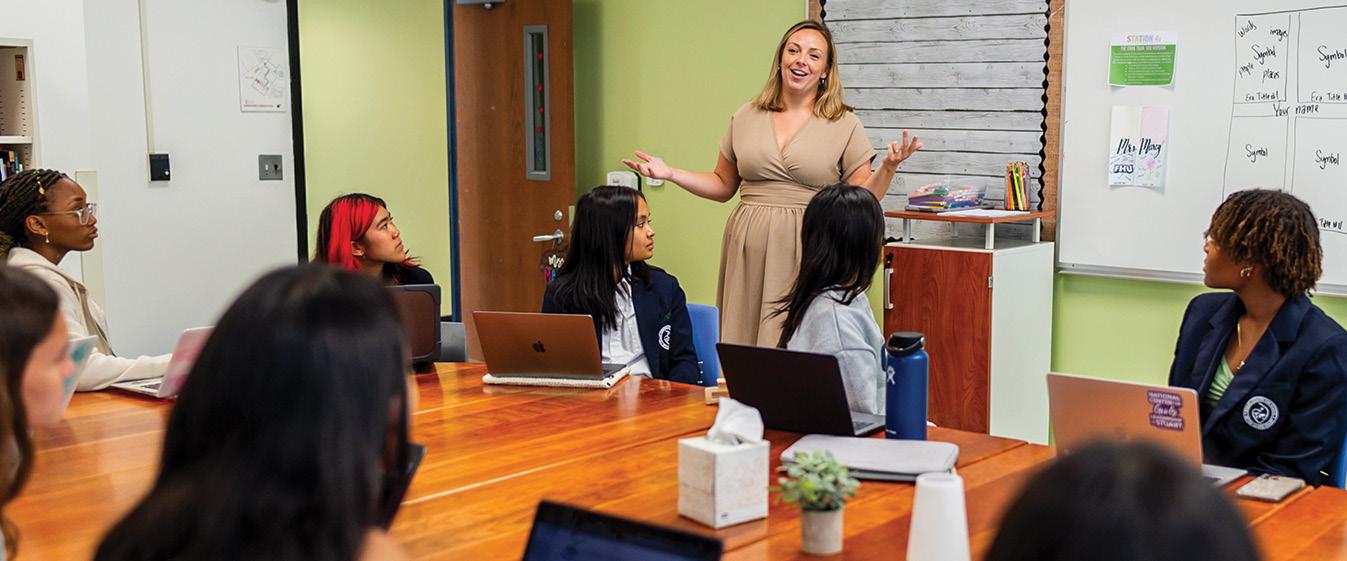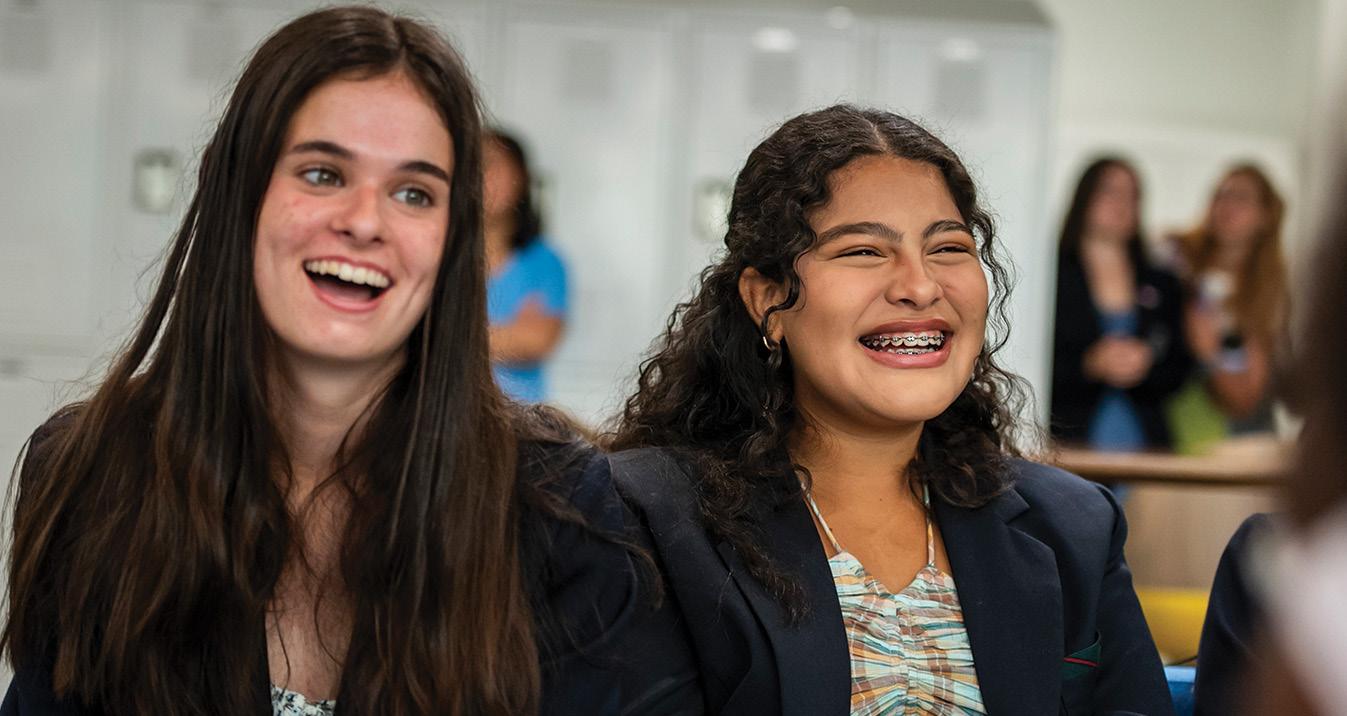

A CALL FOR TRANSFORMATION
Within the landscape of K–12 independent school education, the pursuit of academic excellence has long been the cornerstone of institutional missions. However, as a Sacred Heart girls school committed to fostering the next generation of leaders, we have come to a profound realization: traditional educational paradigms, although invaluable in their own right, fall short in nurturing students’ holistic development.
This white paper explores the philosophy behind what we believe is an imperative shift to a more holistic approach to education—one that acknowledges the interconnectedness of mind, body, and spirit—and its fundamental role in shaping individuals who are not only academically adept but also compassionate, purpose-driven leaders.
Our journey into reimagining student support stemmed from a critical observation of the prevailing disconnects within our own curricular approach. We found ourselves grappling with the lack of synergies among support staff, academic departments, and beyond. This problem prompted

us to delve deeper into the essence of Stuart’s mission, which is to cultivate students who are not merely recipients of knowledge but also dynamic leaders capable of effecting positive change.
Central is the belief that leadership transcends academic prowess: it encompasses a profound understanding of self, a sense of purpose, and a commitment to the well-being of others. As articulated in Stuart’s mission statement, we are dedicated to preparing young women for lives of exceptional leadership and service within the framework of the Goals and Criteria of the Schools of the Sacred Heart. However, making progress toward our vision necessitates a departure from the conventional compartmentalization of education, wherein holistic elements such as mental and physical health, emotional intelligence, and spiritual well-being are often relegated to the periphery.
The rationale behind embracing a more holistic approach to education is rooted in the recognition that true leadership emanates from a place of wholeness—a synthesis of intellectual acumen, emotional resilience, and ethical discernment. At the heart of the philosophy behind Cor Cordis is the acknowledgment that the cultivation of leadership cannot occur in isolation from the broader fabric of human experience. We advocate for a paradigm shift whereby holistic elements of our educational program are not pushed aside; rather, they are seamlessly integrated into the framework of our


academic curriculum. This entails centering the student capacity for understanding and nurturing intellectual, emotional, physical, and spiritual well-being, recognizing these facets as pillars of academic success and personal fulfillment.
In this white paper, we will examine the philosophical motives of holistic education, clarifying its relevance in the context of contemporary pedagogical discourse. Drawing on interdisciplinary insights from psychology, philosophy, and education, we will outline a framework for fostering holistic development within educational institutions. Moreover, we will underscore the practical implications of adopting such an approach, highlighting its transformative potential in cultivating a new generation of leaders who are not only intellectually adept but also empathic, resilient, and ethically grounded.
This white paper serves as a call for reimagining education as a holistic endeavor—one that transcends the confines of traditional academic disciplinary boundaries and embraces the multifaceted nature of human existence. Through this approach, we mean to empower our students to lead lives of purpose, passion, service, and profound significance: testament to the transformative power of education.


DOMAIN 1: SPIRITUAL GROWTH
Trend: Institutions Enhance Spiritual Growth Initiatives to Address Evolving Adolescent Needs
Summary
In today’s world, adolescents are increasingly confronted with cultural relativism and widespread skepticism, both of which contribute to a sense of spiritual and moral uncertainty. As the concept of universal truths is often called into question, many young people find it difficult to define a coherent moral compass. This challenge is particularly acute during adolescence, a developmental period marked by significant identity exploration, emotional turbulence, and a search for meaning and purpose. The erosion of shared moral frameworks has left many adolescents feeling disconnected from the spiritual values that traditionally provided clarity and direction. In an environment in which absolutes are often replaced by subjective interpretations, young people struggle to navigate questions of identity, morality, and faith (Hayward, 2023).
This growing disconnect has led educational institutions to rethink their role in fostering spiritual development. Schools are exploring new approaches that integrate spiritual growth with emotional and social well-being. Spirituality, once seen as a separate or purely personal domain, is now recognized as an essential aspect of holistic adolescent development. This shift in thinking is supported by research from Mary Alice Bruce and Debbie Cockreham (2004), who have found that spirituality can act as a grounding

factor, particularly for adolescent girls, in navigating the many challenges of this developmental stage. Their studies highlight how spiritual engagement fosters resilience, stability, and a sense of purpose during a time when many adolescents are faced with identity confusion, peer pressure, and emotional instability.
By providing students with opportunities for spiritual growth, schools can equip them with the tools needed to better manage the complexities of adolescence. For many young people, spirituality offers a framework for making sense of their experiences and challenges. It can help them cultivate inner strength, find meaning in difficult circumstances, and build a strong foundation of values that will guide them through life’s uncertainties. However, for spiritual development to be meaningful and effective, it must be approached with intentionality. This realization has led many schools to adopt more integrative, data-driven strategies aimed at promoting spiritual growth as part of a comprehensive educational experience.
Scholars such as Dana T. Jebreel, Ronda L. Doonan, and Victor Cohen have proposed innovative frameworks that incorporate spirituality within both educational and therapeutic settings. These frameworks emphasize the importance of collective experiences, shared narratives, and group interactions in fostering spiritual development. Yalom’s group therapeutic factors, often used in counseling and psychology, are being adapted to create educational environments that support open dialogue about spiritual beliefs. In these spaces, students are encouraged to explore their beliefs, reflect on their values, and engage in honest conversations with their peers. This collaborative approach helps students navigate their spiritual paths by fostering community and belonging, enabling them to make sense of their own spiritual beliefs in the context of others’ experiences.

Educational institutions that adopt such integrative strategies are better equipped to meet the spiritual needs of their students, particularly in a world where traditional moral and spiritual frameworks are increasingly questioned. By creating environments that support both individual reflection and collective exploration, schools can help adolescents develop a spiritual foundation that will serve them well throughout their lives. This emphasis on spiritual growth complements broader educational goals, such as fostering emotional intelligence, social responsibility, and critical thinking.
Fostering spiritual growth in adolescents is not only about helping them find meaning and purpose in the present; it is also about inspiring them to contribute to a more just, compassionate, and morally grounded society in the future. Schools that embrace this mission are uniquely positioned to make a lasting impact on the lives of their students and on the broader communities they serve.


DOMAIN 2: INTELLECTUAL CURIOSITY
Trend: Cultivating Intellectual Curiosity in Adolescents: Pathways and Strategies
Summary
Intellectual curiosity is a powerful catalyst for learning, well-being, and longterm success, especially during adolescence—a time of rapid cognitive, emotional, and social development. Encouraging curiosity in adolescents can lead to greater academic engagement, emotional resilience, and a lifelong love of learning. To effectively foster this curiosity, educators must understand how it interacts with individual traits, social dynamics, and educational strategies. By drawing on research from psychology, education, and developmental science, we can identify methods to nurture intellectual curiosity in young learners.
Intellectual curiosity evolves with age, influenced by how adolescents perceive their future and the value they place on curiosity. Chu, Tsai, and Fung (2021) found that adolescents with a long future perspective—who believe they have many opportunities ahead—are more likely to value curiosity and engage in intellectual exploration. These future-oriented students see curiosity as essential for success and personal growth, driving them to explore new ideas and experiences.

Curiosity is both a cognitive asset and a predictor of emotional wellbeing. Research by Kashdan and Steger (2007) shows that curiosity is strongly associated with a sense of meaning in life, psychological wellbeing, and motivation to engage with the world. Adolescents with high levels of curiosity are often more resilient, purposeful in their learning, and better equipped to handle emotional challenges.

Garrosa et al. (2016) further emphasize that curiosity helps buffer against emotional exhaustion, promoting daily engagement and reducing stress. This suggests that curiosity, along with traits such as grit (Duckworth, 2016), plays a vital role in supporting both academic success and emotional resilience.
Moreover, curiosity fosters intrinsic motivation. Gottfried, Fleming, and Gottfried (2001) demonstrated that nurturing intellectual curiosity during childhood leads to sustained academic motivation through adolescence. Curious adolescents are more likely to pursue academic tasks for the joy of learning, contributing to their long-term success.
Inquiry-based learning is one of the most effective ways to cultivate intellectual curiosity. By positioning students as questioners rather than passive recipients of information, this approach taps into their natural curiosity. Clark, Harbaugh, and Seider (2021) tested a question brainstorming intervention, which led to significant increases in curiosity and engagement as students took ownership of their learning. Creating

environments where students feel comfortable asking their own questions fosters not only curiosity but also critical thinking.
In addition, curiosity thrives in rigorous academic environments. Klopfenstein and Thomas (2009) found that students who experience inquiry-based learning tend to have greater early success in college. This underscores the value of intellectual curiosity in settings where higherorder thinking is emphasized and students are encouraged to explore topics in depth.
Curiosity is deeply interconnected with social and emotional experiences. Adolescents often develop curiosity through interactions with peers, teachers, and mentors. Han et al. (2021) explored interpersonal curiosity— the desire to learn about others—and found it closely linked to the development of social skills and emotional intelligence. Collaborative learning environments that encourage discussion and peer feedback provide opportunities for students to explore new perspectives, deepen their understanding, and build social connections.

Curiosity can lead to constructive risk-taking. Reio (2010) found that in supportive environments where adolescents feel safe to take intellectual risks, curiosity flourishes, encouraging greater exploration and creativity. Schools that emphasize a growth mindset can nurture this curiosity and help adolescents build the

confidence to challenge assumptions and take intellectual risks.
Whereas grit—the combination of passion and perseverance—has gained attention as a predictor of success (Duckworth, 2016), curiosity may be equally important in sustaining long-term engagement. Dahl (2016) argues that curiosity serves as the initial spark that drives adolescents to explore new topics and develop a passion for learning. Without curiosity, grit may not be sustainable, as students need intrinsic motivation to pursue challenging goals. Therefore, educators should focus on creating learning environments that not only cultivate perseverance but also ignite curiosity and inspire students to engage with subjects they find meaningful. By creating supportive learning environments that encourage exploration and risk-taking, educators can help students develop the curiosity needed for long-term growth and achievement.


DOMAIN 3: IDENTITY AND CULTURAL INTELLIGENCE
Trend: Recognizing the Role of Identity and Cultural Intelligence as the Foundation for Development
Summary
Adolescence is a critical period for identity formation, one during which individuals begin to explore and consolidate their sense of self. The growing diversity in societies today introduces additional complexities into this process, as adolescents navigate personal development along with an increasing need to understand and adapt to diverse cultural environments. The process of identity formation in adolescence has over the last decade been extensively studied, revealing a dynamic and multifaceted developmental trajectory. Branje et al. (2021) highlight that identity formation is not linear but instead fluctuates as adolescents continuously adjust their self-perceptions in response to internal reflections and external feedback from their environment. At the core of this process is the balancing of personal exploration with a commitment to various roles and values. Adolescents today face a rapidly changing social landscape, influenced by factors such as social media, changing cultural norms, and greater exposure to global perspectives. This increasing complexity makes the development of a clear sense of self more challenging, but also more crucial.

A key aspect of identity development is the integration of cultural identity, particularly in culturally diverse societies. Adolescents growing up in multicultural environments navigate multiple cultural frameworks, adding layers to their identity construction. Branje and colleagues emphasize that this often requires adolescents to reconcile contrasting value systems and expectations, leading to heightened identity exploration and a more nuanced sense of self.
In parallel to identity development, adolescents are honing their ability to navigate cultural diversity through the growth of cultural intelligence (CQ). “Cultural intelligence” refers to an individual’s capacity to function effectively across a variety of cultural contexts. According to Schwarzenthal et al. (2020), CQ is a critical skill for adolescents growing up in diverse societies, as it enables them to understand, respect, and bridge cultural differences in their social interactions.
Cultural intelligence comprises several dimensions, with cognitive, motivational, and behavioral components. Adolescents with high cognitive CQ are better able to grasp cultural norms and differences, whereas those with high motivational CQ are more inclined to engage in cross-cultural interactions. “Behavioral CQ” refers to the ability to adapt one’s actions in culturally diverse settings, a skill that becomes increasingly important as adolescents engage with peers from various backgrounds.
Schwarzenthal et al. (2020) have developed for adolescents a multimodal measure of cultural intelligence, which assesses these dimensions in relation to their broader social and emotional development. The authors’ findings suggest that CQ not only improves adolescents’ ability to interact effectively in diverse environments but also contributes positively to their overall identity development. As adolescents grow more culturally

intelligent, they become more adaptable and resilient, traits that support the successful navigation of identity challenges.
The intersection between identity development and cultural intelligence is particularly significant in the context of personality, communication style, and value orientation. Sooriya et al. (2022) found that adolescents with higher levels of cultural intelligence tend to exhibit more adaptive communication styles and are better able to bridge cultural gaps in their interactions. Cultural intelligence is positively correlated with openmindedness and a value orientation that emphasizes respect for diversity.
Parenting styles also play a role in fostering both identity development and cultural intelligence. Adolescents who perceive their parents as supportive and culturally aware tend to develop stronger CQ, which in turn enhances their identity exploration. This reciprocal relationship suggests that environments that nurture cultural intelligence provide adolescents with the tools they need to integrate diverse experiences into a cohesive sense of self.


DOMAIN 4: EMOTIONAL INTELLIGENCE
Trend: The Importance of Emotional Intelligence in Student Success Summary
Emotional intelligence (EQ) is increasingly acknowledged as foundational in fostering student engagement, resilience, and academic performance. In an era during which academic excellence alone is not enough to ensure students’ future success, schools must also prioritize the development of EQ skills such as self-awareness, empathy, and relationship management. These skills can help students navigate the complexities of their academic journeys and prepare them for the challenges of life beyond the classroom.
A wealth of research supports the idea that students who feel connected, supported, and empowered within their learning environments are more likely to achieve both academically and personally. Studies, including findings from the Gallup Student Poll and research by David S. Yeager, consistently show a strong correlation between emotional intelligence and key outcomes such as student engagement, well-being, and academic achievement. Schools that integrate EQ into their curricula through Social and Emotional Learning (SEL) programs see significant improvements in students’ ability to regulate emotions, manage stress, and foster positive relationships. These skills, in turn, contribute to better academic outcomes and a more fulfilling school experience. Yeager’s work highlights the long-term benefits of SEL programs,

which prepare students to handle life’s inevitable challenges with greater resilience. His research shows that students who develop emotional intelligence through targeted programs not only perform better academically but also demonstrate increased perseverance and adaptability. This connection between emotional intelligence and academic success underscores the importance of teaching students how to manage their emotions and relationships, skills that are crucial for both personal and professional success.
The cultivation of a school environment that fosters emotional intelligence is essential. Schools that prioritize a culture of care, inclusivity, and emotional support see higher levels of student engagement and motivation. Students who feel they belong and are valued within their school community are more likely to perform better academically. The sense of belonging that comes from feeling emotionally supported by peers and teachers strengthens students’ confidence, encourages participation, and builds a foundation for lifelong learning (Pope and Miles, 2022).

The link between emotional intelligence and student success is further reinforced by the work of Kyle Christensen, at West Virginia University, who highlights the importance of helping students identify and leverage their unique strengths. By encouraging students to recognize their individual talents, schools can foster a sense of purpose and self-efficacy, both of which are

key components of emotional intelligence. When students are able to use their strengths in meaningful ways, they not only improve their emotional well-being but also develop the confidence and motivation needed for academic and personal success.
Emotional intelligence is a component of student success that extends beyond academic performance. Schools that invest in the development of EQ skills through SEL programs, supportive climates, and strength-based approaches empower students to thrive in a dynamic, often challenging world. As the research shows, students with high levels of emotional intelligence are more resilient, engaged, and prepared to navigate academic and life challenges with confidence and purpose. By prioritizing the cultivation of EQ alongside traditional academic instruction, K–12 schools can better prepare students for the future, equipping them with the emotional tools they need for lifelong success.


DOMAIN 5: PHYSICAL WELLNESS
Trend: Holistic Physical Wellness in Adolescent Development
Summary
Adolescence is a critical period for growth and development across physical, emotional, and cognitive dimensions, and regular physical activity plays an essential role in promoting well-being in all these areas. A growing body of research underscores the importance of physical activity for improving physical fitness in teens and for fostering their emotional resilience, mental health, improved mood, and academic success. For these reasons, it is imperative that schools, communities, and families prioritize the integration of physical wellness into adolescents’ daily routines.
Research has repeatedly shown the strong connection between physical activity and mental health. Active adolescents are more likely to report increased happiness and emotional stability and show fewer symptoms of anxiety and depression (van Woudenberg et al., 2020; Belcher et al., 2021). Physical activity also helps adolescents better navigate the challenges of academic and social life. In today’s world, where academic pressures and social stressors are ever-increasing, the role of physical activity in providing emotional balance is crucial. Physical wellness serves as a natural outlet for stress and offers a foundation for positive mental health outcomes.
Cognitively, physical activity is linked to enhanced brain function, such as improved concentration, memory, and problem-solving skills, which are essential for academic achievement. Altermann and Gröpel (2024) have

demonstrated that adolescents who engage in regular physical activity tend to perform better academically, particularly in tasks that require sustained concentration and cognitive control. These cognitive benefits of physical activity further illustrate how intertwined physical wellness is with academic success, positioning regular exercise as a key contributor to educational outcomes.
Physical activity also yields long-term benefits. Adolescents who form healthy habits early are more likely to continue these practices into adulthood, fostering a lifetime of better physical and mental health. Studies show that regular physical activity in adolescence contributes to better cardiovascular health, muscle development, and mental resilience well into adulthood. The habits established during these formative years lay the groundwork for a healthy lifestyle that mitigates future health risks such as obesity, heart disease, and mental health disorders.
The responsibility for fostering these healthy habits doesn’t rest solely on the individual. Schools, communities, and families have an obligation to create


environments in which physical wellness is seamlessly woven into everyday life. Schools that incorporate physical activity throughout the day—through active breaks, sports programs, and extracurricular activities—are more likely to support students’ holistic growth.
IN CONCLUSION
Cor Cordis represents a bold step forward in reimagining education as a holistic endeavor— one that transcends the confines of traditional academic disciplinary boundaries and embraces the multifaceted nature of human existence. By fostering the growth of mind, body, and spirit, we aim to empower our students to lead lives of purpose, passion, and profound significance. As a school, we also commit to ongoing research and reflection on this philosophy, as well as to closely monitor and evaluate how students utilize this space, ensuring that Cor Cordis continues to evolve in response to their needs and experiences. Additionally, we are dedicated to sharing our insights and learnings with the broader educational community, striving to empower young girls and women beyond Stuart. By doing so, we hope to inspire other institutions to join us in creating spaces where young women can thrive and grow into their fullest potential.


Dr. Marissa Muoio , Director of National Center for Girls’ Leadership at Stuart, Head of Upper School mmuoio@stuartschool.org
Ms. Julia Breen Wall , Head of School jwall@stuartschool.org 1200 Stuart Road Princeton, New Jersey 08540 stuartschool.org

